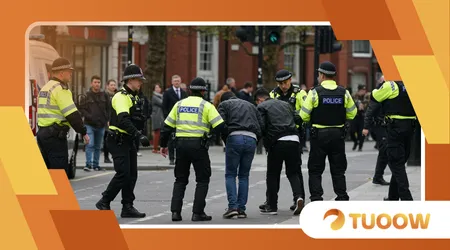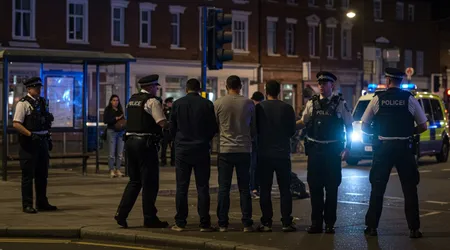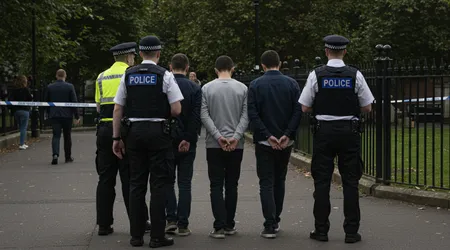UK Police Arrest Five Suspects in Major Counter-Terrorism Operation

A sweeping counter-terrorism operation rocked Britain on May 3, 2025, as police arrested five men, including four Iranian nationals, suspected of plotting a terrorist attack.
The Metropolitan Police, alongside Greater Manchester and Wiltshire forces, executed raids in Swindon, London, Stockport, Rochdale, and Manchester, uncovering a chilling plan targeting a specific, undisclosed location.
Home Secretary Yvette Cooper hailed the operation as one of the most significant in recent years, underscoring the relentless vigilance required to safeguard the nation.
With the UK’s terror threat level at “substantial,” this operation exposes the persistent dangers lurking beneath the surface of daily life.
What does it take to stay one step ahead of such threats? This article delves into the operation’s details, its broader implications, and the delicate balance between security and liberty in modern Britain.
Anatomy of a Counter-Terrorism Operation
Swift action defined the counter-terrorism operation that unfolded across England.
On Saturday, armed officers stormed properties, detaining five men aged 29 to 46 under the Terrorism Act 2006.
Four suspects, Iranian nationals, faced charges of preparing a terrorist act, while the fifth’s nationality remains under investigation.
The Metropolitan Police’s Counter Terrorism Command led the charge, targeting a plot aimed at a single, undisclosed premises.
Commander Dominic Murphy emphasized ongoing efforts to uncover motives and assess public risks.
Witnesses described dramatic scenes. In Rochdale, a suspect was dragged from a home in his underwear, as armed police swarmed the area.
In Swindon, officers trailed a suspect from a café before apprehending him.
These coordinated raids highlight the precision of modern counter-terrorism operations, where intelligence, surveillance, and rapid response converge to neutralize threats.
++ Muhammad Tops England’s Baby Name List, Reflecting Cultural Shifts
The operation’s scale reflects years of refined tactics. Police searched multiple addresses, combing for evidence to piece together the plot’s scope.
The Home Office reported that MI5 and police disrupted 43 late-stage attack plots since 2017, showcasing the relentless pace of counter-terrorism operations in the UK.
This latest effort underscores the stakes: an attack was reportedly hours away, per The Telegraph.

The Iranian Connection: Geopolitical Tensions at Play
The involvement of four Iranian nationals raises questions about foreign influence in the counter-terrorism operation.
Arrests occurred amid heightened UK-Iran tensions, fueled by concerns over Tehran-backed activities on British soil.
The National Security Act 2023, invoked in a parallel operation arresting three other Iranians, empowers police to tackle “foreign power threat activity” without warrants.
Also read: Brexit Legacy Fuels Labor Shortages in Tourism and Hospitality
This legal framework signals Britain’s resolve to counter state-sponsored threats.
Geopolitical context matters. Iran’s regional ambitions and strained Western relations amplify suspicions of its role in destabilizing activities.
The Financial Times noted increased scrutiny of Iranian operatives in Europe, with 2024 seeing multiple foiled plots linked to Tehran.
Yet, no direct evidence ties these suspects to Iran’s government, and investigations continue to clarify motives.
Public perception complicates matters. Social media posts on X speculated about anti-Iran narratives, reflecting skepticism about the arrests’ timing.
Such distrust underscores the challenge of maintaining transparency in counter-terrorism operations without compromising security.
Read more: New Electronic Travel Authorization (ETA) Rules for EU Visitors Take Effect
The government must navigate these tensions while ensuring justice.
Britain’s response includes legislative moves. Home Secretary Cooper announced a review by Jonathan Hall, the independent terrorism legislation reviewer, to explore new measures against hostile states like Iran.
This proactive stance aims to fortify defenses against future threats, balancing diplomacy with security.
Public Safety vs. Civil Liberties: A Delicate Dance
Every counter-terrorism operation sparks debate over security versus freedom. The arrests, executed under sweeping powers, raise concerns about overreach.
Section 27 of the National Security Act allows warrantless arrests for suspected foreign threats, a tool critics argue risks abuse.
Civil liberties groups, like Liberty, warn of disproportionate impacts on minority communities, particularly those of Middle Eastern descent.
Data paints a complex picture. A 2024 Home Office report revealed 247 terrorism-related arrests in the UK, with 60% involving non-UK nationals.
This statistic fuels both security hawks and rights advocates, each interpreting it to suit their narrative.
The challenge lies in ensuring counter-terrorism operations target genuine threats without alienating communities.
| Year | Terrorism Arrests | Non-UK Nationals (%) | Convictions |
|---|---|---|---|
| 2022 | 189 | 55% | 32 |
| 2023 | 214 | 58% | 29 |
| 2024 | 247 | 60% | 35 |
Consider a hypothetical: a British-Iranian student, wrongly swept up in a raid, faces stigma and disruption.
Such scenarios fuel distrust, undermining community cooperation vital to intelligence-gathering.
Conversely, the Rochdale raid’s success nabbing a suspect moments before a potential attack shows why robust powers matter.
Balancing act defines the path forward. Police must engage communities transparently–
The Role of Intelligence in Thwarting Threats
Intelligence drives every successful counter-terrorism operation. The May 3 raids stemmed from meticulous work by MI5 and police, who tracked suspects for weeks.
Surveillance, intercepted communications, and human informants likely played roles, though details remain classified.
This operation’s timing hours from an attack highlights intelligence’s life-saving potential.
Real-world examples abound. In 2017, MI5 thwarted a Parsons Green bombing plot by analyzing online chatter.
Similarly, the 2025 operation relied on cross-agency collaboration, with Greater Manchester and Wiltshire forces bolstering the Met’s efforts.
Such synergy maximizes reach, ensuring no threat slips through.
Yet, intelligence isn’t infallible. The 2005 London bombings exposed gaps in preemptive detection, spurring reforms.
Today’s counter-terrorism operations leverage AI and data analytics, but human judgment remains king. Overreliance on tech risks missing nuanced cues, like a suspect’s café visit in Swindon.
Public cooperation is equally vital. A tip from a Rochdale neighbor, noticing odd behavior, could’ve sparked the raid. Encouraging vigilance without fostering paranoia is key.
Why not empower communities to be the eyes and ears of security, without fear of reprisal?
Looking Ahead: Strengthening National Security

The counter-terrorism operation exposes Britain’s evolving threat landscape. With the terror threat level at “substantial,” meaning an attack is likely, authorities face unrelenting pressure.
The arrests signal progress but also vulnerabilities. How can the UK stay ahead of adaptive adversaries?
Legislative innovation offers one path. The proposed “proscription mechanism” for hostile states, as flagged by Jonathan Hall, could deter foreign-backed plots.
Pairing this with community outreach like police forums in Rochdale builds trust, ensuring locals feel safe reporting suspicions.
Technology also holds promise. Advanced surveillance, like facial recognition, enhances tracking, but ethical concerns linger.
A 2024 trial in London saw 12% false positives, risking innocent detentions. Refining these tools, while protecting privacy, is non-negotiable.
Finally, international cooperation is critical. Sharing intelligence with allies, as seen in 2024’s EU-wide Iranian plot crackdowns, amplifies impact.
Britain’s leadership in global counter-terrorism operations can set a standard, but only with balanced, transparent policies.
Conclusion: A Nation on Guard
The counter-terrorism operation of May 3, 2025, is a stark reminder of Britain’s fragile security. Five arrests, hours from disaster, reflect the courage and precision of police and MI5.
Yet, the Iranian connection, civil liberties concerns, and intelligence demands reveal deeper challenges.
This operation isn’t just a victory it’s a call to refine strategies, engage communities, and confront geopolitical realities.
Like a lighthouse in a storm, Britain’s security apparatus must guide the nation through turbulent waters, unwavering but adaptable.
The public’s trust, hard-earned, is the bedrock of this fight. As threats evolve, so must the resolve to protect without sacrificing values.
Frequently Asked Questions
What triggered the May 3, 2025, counter-terrorism operation?
Police acted on intelligence suggesting a terrorist plot targeting a specific premises, leading to arrests in multiple UK cities.
Are the arrested suspects linked to Iran’s government?
No direct evidence confirms state sponsorship, but the suspects’ Iranian nationality has raised suspicions amid UK-Iran tensions.
How does the UK balance security and civil liberties?
Authorities use laws like the National Security Act, but critics argue these risk overreach, necessitating transparent community engagement.
What role do citizens play in counter-terrorism?
Public vigilance, like reporting suspicious activity, is crucial, as seen in potential tips from Rochdale residents aiding the operation.
